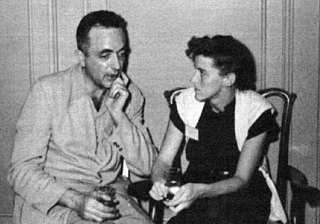
Katherine Anne MacLean was an American science fiction author best known for her short fiction of the 1950s which examined the impact of technological advances on individuals and society.

Philip Kindred Dick, often referred to by his initials PKD, was an American science fiction writer and novelist. He wrote 44 novels and about 121 short stories, most of which appeared in science fiction magazines during his lifetime. His fiction explored varied philosophical and social questions such as the nature of reality, perception, human nature, and identity, and commonly featured characters struggling against elements such as alternate realities, illusory environments, monopolistic corporations, drug abuse, authoritarian governments, and altered states of consciousness. He is considered one of the most important figures in 20th-century science fiction.

Friday is a 1982 science fiction novel by American writer Robert A. Heinlein. It is the story of a female "artificial person", the eponymous Friday, genetically engineered to be stronger, faster, smarter, and generally better than normal humans. Artificial humans are widely resented, and much of the story deals with Friday's struggle both against prejudice and to conceal her enhanced attributes from other humans. The story is set in a Balkanized 21st century, in which the nations of the North American continent have been split up into a number of smaller states.
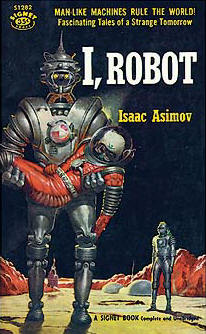
The Three Laws of Robotics are a set of rules devised by science fiction author Isaac Asimov, which were to be followed by robots in several of his stories. The rules were introduced in his 1942 short story "Runaround", although similar restrictions had been implied in earlier stories.
"Faith of Our Fathers" is a science fiction short story by American writer Philip K. Dick, first published in the anthology Dangerous Visions (1967).
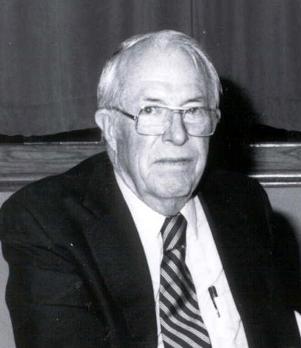
John Stewart Williamson, who wrote as Jack Williamson, was an American science fiction writer, one of several called the "Dean of Science Fiction". He is also credited with one of the first uses of the term genetic engineering. Early in his career he sometimes used the pseudonyms Will Stewart and Nils O. Sonderlund.

The Naked Sun is a science fiction novel by American writer Isaac Asimov, the second in his Robot series. Like its predecessor, The Caves of Steel, this is a whodunit story. It was first published in book form in 1957 after being serialized in Astounding Science Fiction between October and December 1956.

"The Last Question" is a science fiction short story by American writer Isaac Asimov. It first appeared in the November 1956 issue of Science Fiction Quarterly and in the anthologies in the collections Nine Tomorrows (1959), The Best of Isaac Asimov (1973), Robot Dreams (1986), The Best Science Fiction of Isaac Asimov (1986), the retrospective Opus 100 (1969), and in Isaac Asimov: The Complete Stories, Vol. 1 (1990). While he also considered it one of his best works, "The Last Question" was Asimov's favorite short story of his own authorship, and is one of a loosely connected series of stories concerning a fictional computer called Multivac. Through successive generations, humanity questions Multivac on the subject of entropy.

X Minus One is an American half-hour science fiction radio drama series that was broadcast from April 24, 1955, to January 9, 1958, in various timeslots on NBC. Known for high production values in adapting stories from the leading American authors of the era, X Minus One has been described as one of the finest offerings of American radio drama and one of the best science fiction series in any medium.
"Sales Pitch" is a science fiction short story by American writer Philip K. Dick, first published in Future Science Fiction magazine, June 1954. The premise is the omnipresent, intrusive and even aggressive advertising and marketing. At the end of the story, the protagonist is driven mad by a robot who can forcefully market himself, and refuses to take no for an answer. The subject was of concern to Dick, and features in his early works such as The Man Who Japed.

"Shell Game" is a science fiction short story by American writer Philip K. Dick. It was submitted to the Scott Meredith Literary Agency and received by SMLA on December 12, 1953. It was published in Galaxy Science Fiction in September 1954.
"The War with the Fnools" is a science fiction short story by American writer Philip K. Dick. It was first published in Galaxy magazine in 1969.
"Explorers We" is a science fiction short story by American writer Philip K. Dick. First published in Fantasy and Science Fiction magazine, January 1959. "Explorers We" was reprinted as a limited edition booklet to commemorate Dick's appearance at the Second International Festival of Science Fiction at Metz, France, September 1977. It was written in 1958, one of only two short stories that Dick wrote in the seven years between 1956 and 1962.

"The Defenders" is a 1953 science fiction novelette by American author Philip K. Dick, and the basis for Dick's 1964 novel The Penultimate Truth. It is one of several of his stories to be expanded into a novel. The story was first published in the January 1953 issue of Galaxy Science Fiction.
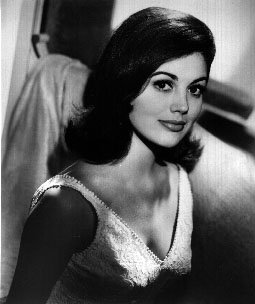
Linda Melson Harrison is an American actress. She played Nova in the science fiction film classic Planet of the Apes (1968) and the first sequel, Beneath the Planet of the Apes; she also had a cameo in Tim Burton's 2001 remake of the original. She was a regular cast member of the 1969–70 NBC television series Bracken's World. She was the second wife of film producer Richard D. Zanuck ; her youngest son is producer Dean Zanuck.

"Soldier Boy" is a 1953 science fiction short story by American author Michael Shaara, about a soldier who, when sent on a routine patrol to a colonized world, saves the planet from an alien and its robot attack devices. Despite an ingrained contempt for the military that arose as part of conditioning to avoid war, the human colonists gradually assist the soldier when strange occurrences suggest they are not alone on the planet and may be, like several other colony planets, under threat of extermination by outside forces.

The Eye of the Heron is a 1978 science fiction novel by American author Ursula K. Le Guin which was first published in the science fiction anthology Millennial Women.
"Expendable" is a science fiction short story by American writer Philip K. Dick. It was first published in The Magazine of Fantasy and Science Fiction issue of July 1953. The plot centers on an unnamed human being caught in the middle of the ongoing, million year conflict between the degenerate descendants of the insects and humans.

"With Folded Hands ..." is a 1947 science fiction novelette by American writer Jack Williamson (1908–2006). In writing it, Willamson was influenced by the aftermath of World War II, the atomic bombings of Hiroshima and Nagasaki, and his concern that "some of the technological creations we had developed with the best intentions might have disastrous consequences in the long run."
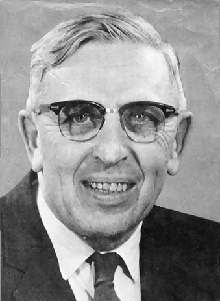
Clifford Donald Simak was an American science fiction writer. He won three Hugo Awards and one Nebula Award. The Science Fiction Writers of America made him its third SFWA Grand Master, and the Horror Writers Association made him one of three inaugural winners of the Bram Stoker Award for Lifetime Achievement. He is associated with the pastoral science fiction subgenre.















